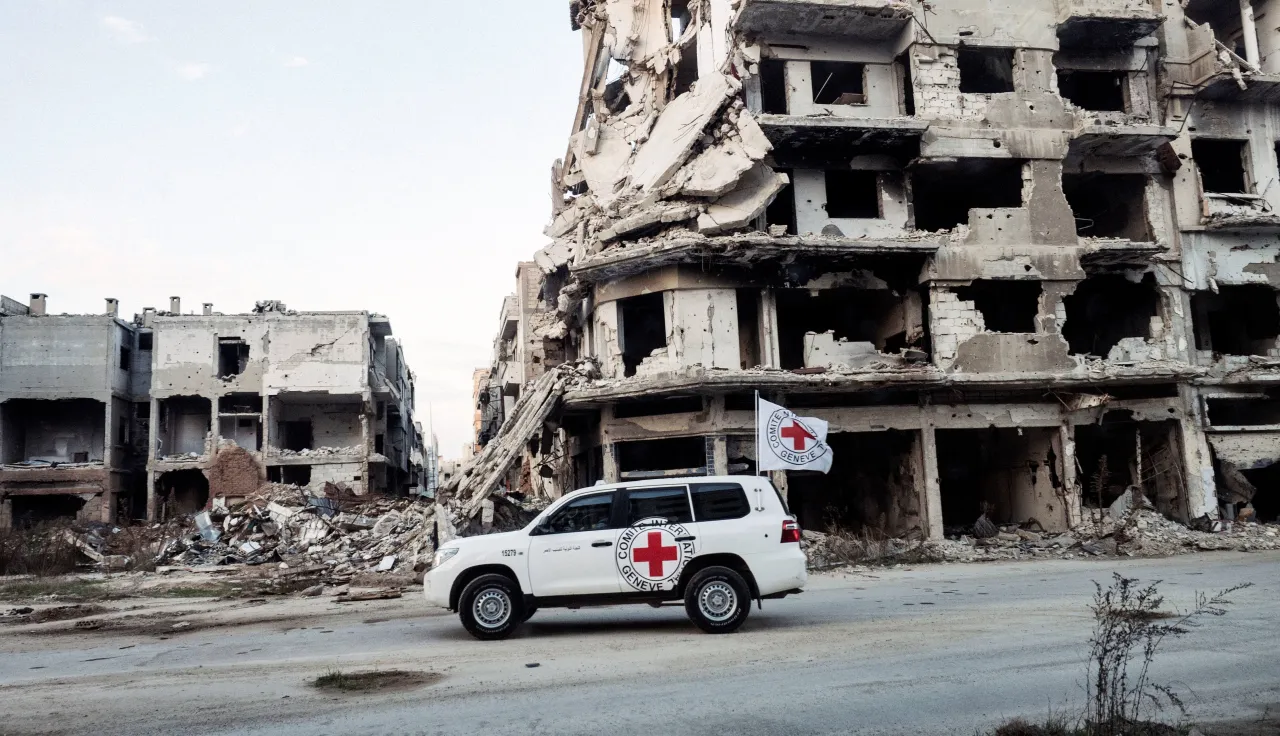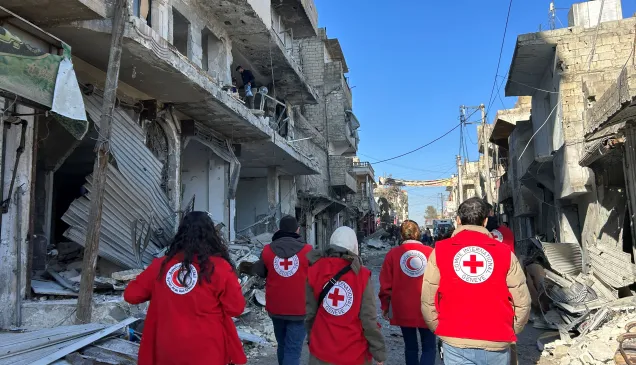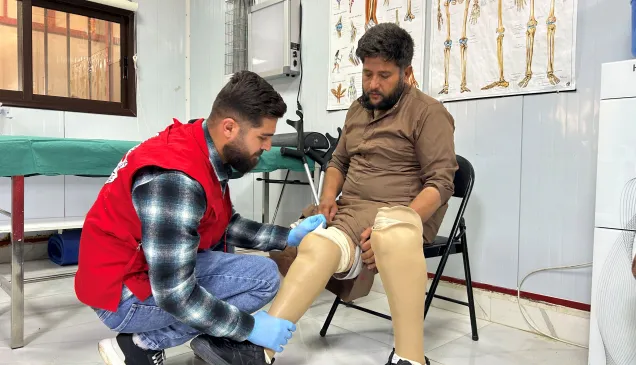ICRC Head of Delegation in Syria: Detention Work Remains Our Top Priority

The ICRC has regularly offered its services to visit detention facilities in Syria to various parties involved in the conflicts. Since the onset of the armed conflict in 2011 and up until November 2024, the ICRC has made persistent and concerted efforts to gain access to all individuals deprived of their freedom in the country, including those held in facilities under the responsibility of the former Government of Syria.
In this interview, Stephan Sakalian, ICRC Head of Delegation in Syria, answers questions about the organization’s detention work in Syria over the years and provides insights into future prospects.
-
Since the start of the armed conflict in Syria, the ICRC has consistently sought to expand its access to as many detention facilities as possible across the country, continuing these efforts through November 2024. Over the past 13 years, the ICRC has submitted written requests to Syrian authorities and other parties to the conflict, including armed groups, to access detention facilities to conduct humanitarian activities.
Regarding places of detention under the responsibility of the former Government of Syria, the ICRC has made continuous and determined efforts to gain access to all individuals deprived of their freedom, including those detained by security and military forces as well as those held by armed groups.
Although the ICRC was granted access to detention facilities under the Ministry of Interior and the Ministry of Social Affairs and Labor (responsible for juvenile centers), it was denied access to other facilities—such as Sednaya Prison and facilities managed by other ministries and security apparatuses. Despite repeated and persistent requests at all levels, the former Syrian authorities did not grant broader access. The last written request, submitted in November 2024, focused specifically on security detainees.
In conclusion, while the ICRC was the only international organization granted access to detention facilities in Syria over the last 13 years, this access was far from sufficient, given the significant number of detainees the organization was unable to reach.
-
Since 2011, the ICRC has consistently worked to improve detention conditions for individuals in facilities to which it had access. Over 13 years, ICRC delegates conducted 268 visits to facilities under the authority of the Ministry of Interior and the Ministry of Social Affairs and Labor, including regular visits to central prisons and juvenile centers. These visits adhered to the ICRC’s globally recognized working procedures for detainee visits.
During this time, the ICRC was able to visit over 30,000 detainees in these facilities. Detainees benefited from essential supplies provided by the ICRC, including hygiene items, clothing, and other necessities to ease their confinement. In several prisons, the ICRC improved living conditions for more than 22,500 detainees by upgrading water points, family waiting areas, and ventilation systems, and by donating tools and spare parts for facility maintenance.
Additionally, the ICRC equipped prison clinics, supplied medical materials, and trained medical staff to improve detainees’ access to healthcare. Family-links services facilitated phone calls and exchanges of oral and written messages, reconnecting nearly 28,724 detainees with their families.
-
The ICRC’s position on torture is unequivocal: torture and all forms of cruel, inhumane, degrading, or humiliating treatment are strictly prohibited under international humanitarian law (IHL) and international human rights law (IHRL). This prohibition is derived from the Geneva Conventions of 1949, their Additional Protocols of 1977, Customary International Humanitarian Law, and the Convention against Torture and Other Cruel, Inhuman, or Degrading Treatment or Punishment of 1984, among other instruments.
The ICRC takes allegations of torture very seriously, following up on them directly with the concerned authorities and the individuals involved. However, the ICRC does not share its findings publicly, whether regarding general observations or specific cases. The organization engages in confidential, bilateral dialogue with relevant authorities, a method it applies in Syria and the rest of the world.
-
The ICRC seeks to maintain or expand access to affected communities, including detainees, by building trust through confidential dialogues with all parties involved in armed conflicts or other situations of violence.
Confidentiality allows the ICRC to maintain dialogue with all sides, enabling access to detainees and helping them directly.
However, confidentiality does not equate to complacency or silence. Any decision to publicly address issues must carefully weigh the risks, including the possibility of losing access to detainees and being unable to provide critical protection and assistance to communities caught up in conflict and violence.
From 2011 to 2024, the ICRC made continuous efforts to expand its access to detention facilities in Syria. Throughout this period, the ICRC delegation in Damascus and senior ICRC leaders, who regularly visited Syria, engaged in dialogue with the former Syrian authorities at all levels to broaden access to detention facilities. Guided by its humanitarian mandate under the Geneva Conventions, the ICRC has also consistently sought the support of states capable of influencing the former Syrian authorities for expanded access. Over the past 13 years, ICRC delegates conducted 268 visits to detention centers under the Ministry of Interior and the Ministry of Social Affairs and Labor, visiting over 30,610 detainees.
-
For over 140 years, the ICRC has been visiting detainees to monitor their conditions of detention. Initially focused on those held in connection with armed conflicts and other situations of violence, the ICRC’s work has expanded to include various categories of detainees.
The ICRC’s objectives are to:
- Prevent forced disappearances, extrajudicial executions, and ill-treatment.
- Ensure detainees’ dignity and well-being are respected.
- Promote conditions of detention that align with laws and internationally recognized standards.
By engaging with authorities, the ICRC addresses the causes and consequences of problems affecting detainees, aiming to make a tangible difference in their lives.
-
The ICRC will continue to extend its services to authorities in Syria and other parties, offering to visit detainees under their responsibility. It also remains active in visiting places of detention under the authority of the Syrian Democratic Forces (SDF) in northeast Syria and has established hotlines to support former detainees and their families.
ICRC visits contribute to ensuring humane treatment and conditions, not only through direct assistance but also by providing guidance and advice on the proper and adapted management of detention facilities. Given the current circumstances, the ICRC expects to be granted access to all places of detention in Syria and to conduct its visits according to its globally recognized methods.
The ICRC also highlights growing concerns about preserving vital records held by state institutions as prisons open and detainees are released. This includes safeguarding potential grave sites and critical documentation such as arrest logs, detainee lists, hospital and court records, and other materials that could clarify the fate and whereabouts of missing persons.
To prevent the destruction of these crucial records, the ICRC has called on all relevant parties across Syria to protect them. It has also offered its services to authorities to help preserve both material and digital records and safeguard gravesites.
Furthermore, the ICRC expects the competent authorities of the caretaker government to ensure that any new detention policies explicitly prevent and end incommunicado detention. Newly detained individuals must have the right to inform their families of their whereabouts and be afforded judicial guarantees that preserve their rights and dignity. Families must also be informed of detention locations and allowed to conduct visits in line with recognized standards and legislation.



